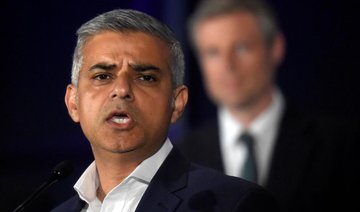LONDON: The largest Muslim organization in Britain has called for an independent inquiry into Islamophobia within the governing Conservative party.
Harun Khan, secretary-general of the Muslim Council of Britain (MCB), sent an open letter to the party chairman, Brandon Lewis, strongly criticizing the Conservatives for failing to tackle the “simmering underbelly of Islamophobia” in their ranks.
He was immediately backed by one of the most senior Muslim Conservatives, Sayeeda Warsi, a Cabinet member under former prime minister David Cameron, who said that the party had “buried its head in the sand” over the allegations.
Khan said that there were “more than weekly” incidents of Islamophobia within the party and singled out Bob Blackman as a member of parliament with “a consistent record of endorsing Islamophobia” while facing no reprimand from his party leadership. Blackman denied the accusations.
 The MCB is an umbrella body representing 500 Muslim groups and schools in the UK. The letter, published on Wednesday, highlighted nine alleged incidents of Islamophobia by Conservatives in the past two months alone.
The MCB is an umbrella body representing 500 Muslim groups and schools in the UK. The letter, published on Wednesday, highlighted nine alleged incidents of Islamophobia by Conservatives in the past two months alone.
Those named included Mike Payne, a Conservative councillor from Yorkshire in northern England, who in 2013 — before he was a councillor — shared an article which called Muslims “parasites” and “freeloaders.”
Others mentioned in the letter included council candidates Alexander van Terheyden, who called Islam a “violent political ideology” comparable to fascism and communism, and David Boston, who posted a photo of bacon hanging from a door handle with the caption, “Protect your house from terrorists.”
“These cases are just the tip of the iceberg and what is in the public domain,” wrote Khan. “Furthermore the inaction taken in high-profile cases sends a signal that Islamophobia is to be tolerated in the Conservative party.”
While Payne, van Terheyden and Boston have been suspended from the Conservative party, the same fate has not befallen Blackman or Zac Goldsmith, Conservative candidate for mayor of London in the 2016 election.
During the election campaign Goldsmith made remarks suggesting that his opponent, and the eventual victor, Sadiq Khan, would be a security risk.
Such “shocking Islamophobia” in the mayoral contest “left Muslim communities reeling,” Khan, the MCB secretary-general, wrote. “There has been no censure of Mr. Goldsmith’s action and he has instead been invited to represent your party again.”
When he became chairman of the Conservative party in January, Lewis introduced a new code of conduct requiring members to “encourage and foster respect and tolerance.” He also asked people to report incidences of bigotry directly to him via email.
Blackman, the MP singled out in the MCB letter, represents a constituency in the north London suburbs that includes a significant Muslim population.
He previously faced criticism for retweeting an anti-Muslim post by far-right activist Tommy Robinson and hosting an event attended by the controversial Hindu nationalist Tapan Ghosh in parliament. He was also accused of belonging to Islamophobic Facebook groups. The MP denied the allegations yesterday.
“I utterly refute this allegation,” he told Arab News. “I was added to Facebook groups without my knowledge or permission and immediately removed myself from them when I became aware I had been added.”
Ghosh, the founder of Hindu Samhati, a nationalist group based in India, has called for the UN to control the birth rate of Muslims and advocates Muslims being forced to abandon their religion if they migrate to a Western country.
Last October he appeared at two parliamentary functions that were hosted by Blackman, who is chairman of the All Party Parliamentary Group for British Hindus. But the MP insists Ghosh was not his personal guest.
“I did not host Tapan Ghosh in parliament. He was invited by an organization without my knowledge,” he told Arab news.
Concerning other allegations, Blackman said: “In the past I shared a social media post in error, which I apologized for at the time. I will continue working with all communities in my constituency and I condemn Islamophobia.”
In his letter Khan urges the Conservatives to launch a “genuinely independent inquiry into Islamophobia” inside the party, publish a list of Islamophobic incidents within the party where action has already been taken and “publicly reaffirm from the highest level a commitment against bigotry wherever is found.”
In response to the letter, a Conservative spokesman said: “We take all such incidents seriously, which is why we have suspended all those who have behaved inappropriately and launched immediate investigations.”

























